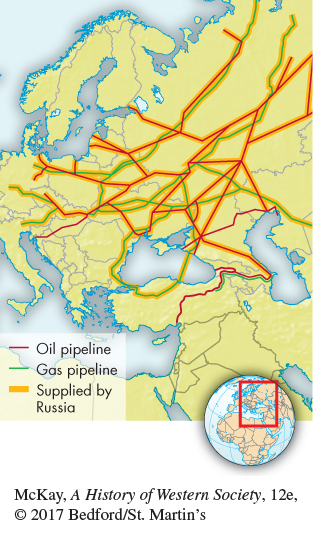A History of Western Society: Printed Page 1050
A History of Western Society, Value Edition: Printed Page 1013
A History of Western Society, Concise Edition: Printed Page 1059
Dependence on Fossil Fuels
One of the most significant long-

Struggles to control and profit from these shrinking resources often resulted in tense geopolitical conflicts. The need to preserve access to oil, for example, has led to a transformation in military power in the post–Cold War world. Between 1945 and 1990 the largest areas of military buildup were along the iron curtain in Europe and in East Asia, as U.S. forces formed a bulwark against the spread of communism. Today military power is increasingly concentrated in oil-
The global struggle for ample energy has placed Russia, which in 2011 became the world’s number-
Beyond military action, Russian leaders readily use their control over energy to assert political influence. The Russian corporation Gazprom, one of the world’s largest producers of natural gas, sells Europe about 30 percent of its natural gas, and the EU treads softly with Russia to maintain this supply. Russia is willing to play hardball: it has engaged in over fifty politically motivated disruptions of natural gas supply in the former Soviet republics, including one in January 2009 when Russia shut off supplies to Ukraine for three weeks, resulting in closed factories and no heat for hundreds of thousands of people. “Yesterday tanks, today oil,” a Polish politician remarked about Russia’s willingness to use energy to exert influence in central Europe.19